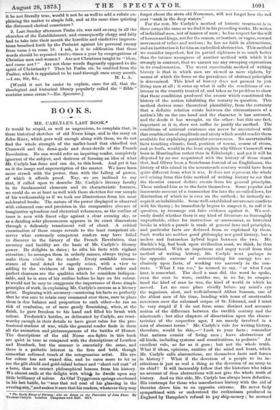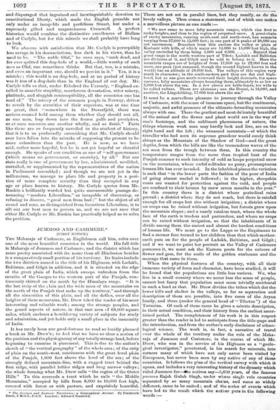BOOKS.
MR. CARLYLE'S LAST BOOK.*
IT would be stupid, as well as ungracious, to complain that, in these historical sketches of old Norse kings, and in the essay on John Knox, which goes well enough along with them, we do not find the whole strength of the mallet-hand that chiselled out Cromwell and the demi-gods and demi-devils of the French Revolution. No one would refer an inquiring reader, completely ignorant of the subject, and desirous of forming an idea of what Mr. Carlyle has done and can do, to this book. And yet it has on it the image and superscription of the master. We have been more struck with the power, than with the failing of power, of which it affords proof. Nay, we are inclined to say that, if called upon to describe Mr. Carlyle's literary faculty in its fundamental elements and its characteristic features, we could do so at least as well with these sketches for our sample of his workmanship as if we took our illustrations from his moat celebrated books. The nature of the power displayed is observed with enhanced ease and precision in the comparative absence of imaginative splendour and rhetorical vehemence, as the outline of trees is seen with finest edge against a clear evening sky, or as a dazzling solar phenomenon appears in its exact dimensions through a delicately translucent veil of cloud. A critical examination of these essays reveals to the least competent ob- server what extremely competent readers may have failed to discover in the history of the French Revolution, that accuracy and lucidity are the basis of Mr. Carlyle's literary power. He delights in dates ; he sifts his facts with vigilant attention ; he arranges them in orderly masses, always trying to make them visible to the reader. Every available circum- stance of local detail he eagerly seizes, with a view to adding to the vividness of his picture. Perfect order and perfect clearness are the qualities which he considers indispen- sable, and he is sure of his outline before he lays on his colour. It would not be easy to exaggerate the importance of these simple principles of work, in explaining Mr. Carlyle's success as a literary artist. Beginning with accuracy—mastering his facts so perfectly that he was sure to retain easy command over them, sure to place them in due balance and proportion to each other—he ran no risk of confusion, or of mere gaudy flourishing, when, at the finish, he gave freedom to his hand and filled his brush with colour. Frederick's battles, as delineated by Carlyle, are trust- worthy enough in their details to have great value for the pro- fessional student of war, while the general reader finds in them all the animation and picturesqueness of the battles of Homer. The descriptions of the old Norse sea-fights in this book are quiet in tone as compared with the descriptions of Leuthen and Rossbach, but the manner is essentially the same, and there is a pathetic interest in the firm and bold, though somewhat softened touch of the octogenarian artist. His eye for colour has not waxed dim, and he cares more to let us see the gilt shield and-gold-inlaid helmet and "short red coat" of a hero, than to extract philosophical lessons from his history. We almost smile at the delight with whice he dwells upon any little brilliancy of colour. As Olaf Tryggveson springs overboard in his last battle, he "sees that red coat of his glancing in the evening sun," and makes it sure that his readers, whatever they may The Early Kings of Norively : also an Essay on the Portraits of John Knox. By Thomas Carlyle. London Chapman and Hall. 1875.
forget about the stern old Norseman, will not forget how the red coat "sank in the deep waters."
For the rest, Mr Carlyle's method of historic treatment is in these essays the same as we find it in his preceding works. He writes of individual men, not of masses of men ; he has respect for the will of heroes and kings, not for the reason, or instinct, or vague, onward movement of tribes and nations; he has no faith in abstractions, and an institution is for him an embodied abstraction. This method we consider imperfect, but its partial rightness is so much better than the intense wrongness of another method with which it is strongly in contrast, that we cannot use any sweeping expressions in its condemnation. The worst conceivable method of writing history is that in which men are viewed as mere ciphers, by means of which the force or the prevalence of abstract principles is determined. This kind of history does not present to you living men at all ; it sums up what it calls the conditions of ex- istence in the country treated of, and takes as its problem to show that these conditions produced the events which constituted the history of the nation inhabiting the country in question. This method derives some theoretical plausibility, from the certainty that a definite relation exists between the circumstances of a nation's life on the one hand and the character it has assumed, and the deeds it has wrought, on the other : but this one fact, important as it is, does not suffice to justify the method. The conditions of national existence can never be ascertained with that combination of amplitude and nicety which would render them available for explaining particular occurrences. No ascertainable facts touching climate, food, position of towns, course of rivers, and so forth, would in the least explain why Oliver Cromwell was born in Huntingdon rather than in Edinburgh ; and yet it will be disputed by no one acquainted with the history of those times that, had Oliver been a Scotchman instead of an Englishman, the history of this island in the seventeenth century would have been quite different from what it was. It does not represent the whole evil arising from this false method of writing history to say that the theorist cannot deduce events from his general principles. These mislead him as to the facts themselves. Some popular and inaccurate account of a transaction fits into the so-called laws, for illustration of which he is ever on the outlook ; he instantly ac- cepts it as indubitable. Some well-established occurrence conflicts with his theory ; he immediately begins to suspect it, to call it in question, to rummage out false evidence against it. We seri- ously doubt whether there is any kind of literature so thoroughly unprofitable, either for instruction or amusement, as historical books in which a parade is made of general laws and principles, and particular facts are deduced from or explained by these. Such works are neither good philosophy nor good history, but a 'useless and featureless hybrid begot between the two. Mr. Buckle's big, bad book upon civilisation must, we think, be thus characterised. With an impetuous and angry recoil from this method of writing history, Mr. Carlyle went perhaps to the opposite extreme of concentrating his energy too ex- clusively upon facts, of working too narrowly in the con- crete. " What I can see," he seemed to say, " or what I can hear, is somewhat. The deed a man did, the word he spoke, even the coat he wore, enables me, in so far, to compre- hend the kind of man he was, the kind of world in which he moved. Let me once place vividly before my mind's eye the sagacious, alert, and well-informed Abbot Samson, one of the ablest men of his time, bending with tears of unutterable reverence over the exhumed corpse of St. Edmund, and I must be very stupid if I do not form some distinct and accurate notion of the difference between the twelfth century and the nineteenth ; but after chapters of dissertation upon the charac- teristics of the respective ages, I am merely involved in a mist of abstract terms." Mr. Carlyle's rule for writing history, therefore, would be this,—" Look to your facts ; remember that nations consist of living men ; leave abstractions of all kinds, including systems and constitutions, to pedants." An excellent rule, so far as it goes ; but not the whole truth. What if ideas, opinions, entities of the mind and heart, which Mr. Carlyle calls abstractions, are themselves facts and forces in history ? What if the devotion of a people to its in- stitutions ie just as real a thing as the devotion of an army to its chief? It will inexorably follow that the historian who takes no account of these abstractions will not give the whole truth of history. And on this side, Mr. Carlyle has always been defective. His contempt for those who manufacture history with the aid of theories drove him to an opposite extreme. He never fully sympathised with or understood the enthusiasm produced in England by Hampden's refusal to pay ship-money ; he scorned and disparaged that ingrained and inextinguishable devotion to constitutional liberty, which made the English grumble not only under an incapable and perfidious Stuart, but under a supremely gifted and magnanimous CromwelL A perfect historian would combine the distinctive excellences of Hallam and of Carlyle, but for this miracle we shall probably have long to look.
We observe with satisfaction that Mr. Carlyle is perceptibly less savage in his denunciations, less dark in his views, than he used to be. "The noble Olaf," he once says, "sank dead, and for ever quitted this dog-hole of a world,—little wortiry of such men as Olaf, one sometimes thinks. But that, too, is a mistake, and even an important one, should we persist in it." Yes, it is a mistake ; this world is no dog-hole, and at no period of history was it less of a dog-hole than in the England of our day. Mr. Carlyle tells us that, under Ethelred the Unready, "England ex- celled in anarchic stupidity, murderous devastation, utter misery, platitude, and sluggish contemptibility, all the countries one has read of." The misery of the common people in Norway, driven to revolt by the atrocities of their superiors, was at one time so great, that "somewhere in the Doverfjeld, there was serious counsel held among them whether they should not all, as one man, leap down into the frozen gulfs and precipices, or at once massacre one another wholly, and so finish." Facts like these are so frequently unveiled to the student of history, that it is to us profoundly astonishing that Mr. Carlyle should ever have fallen into the mistake of supposing the present to be more calamitous than the past. He is now, as we have said, rather more hopeful, but he is not yet hopeful or cheerful enough. He speaks of our condition as one of " self-government (which means no government, or anarchy), by all." But our state really is one of government by law, administered, modified, curtailed, or supplemented by the representatives of the nation in Parliament assembled ; and though we are not yet in the millennium, we manage to place life and property in a posi- tion of more complete security than they occupied in any age or place known to history. Mr. Carlyle quotes from Mr. Ruskin a brilliantly worded but quite unreasonable passage de- nouncing " modern Liberalism," as incapable of discerning, or refusing to discern, "good men from bad ;" but the object of all sound and sane, as distinguished from licentious Liberalism, is to sift out our best men to govern us, and we are not sure that either Mr. Carlyle or Mr. Ruskin has practically helped us to solve the problem.































 Previous page
Previous page